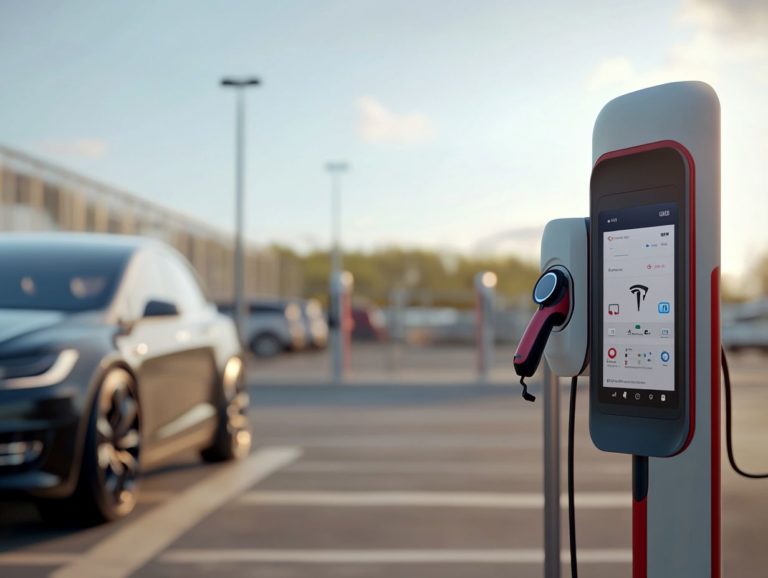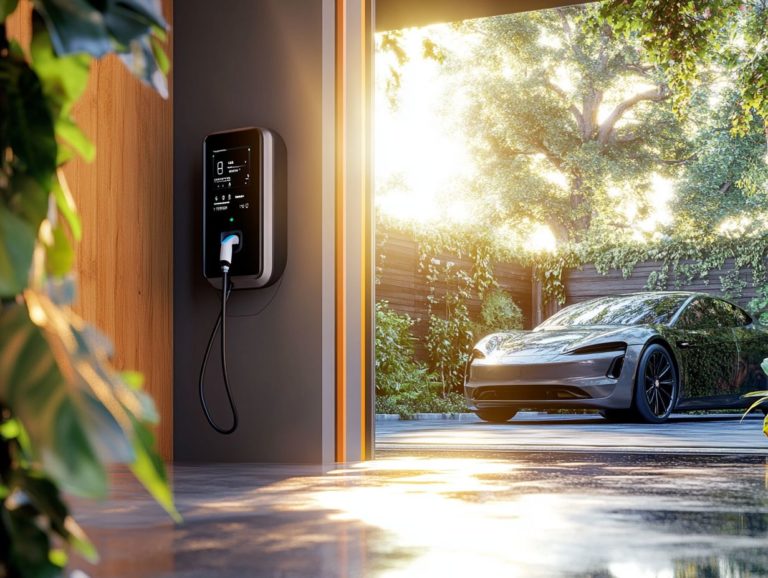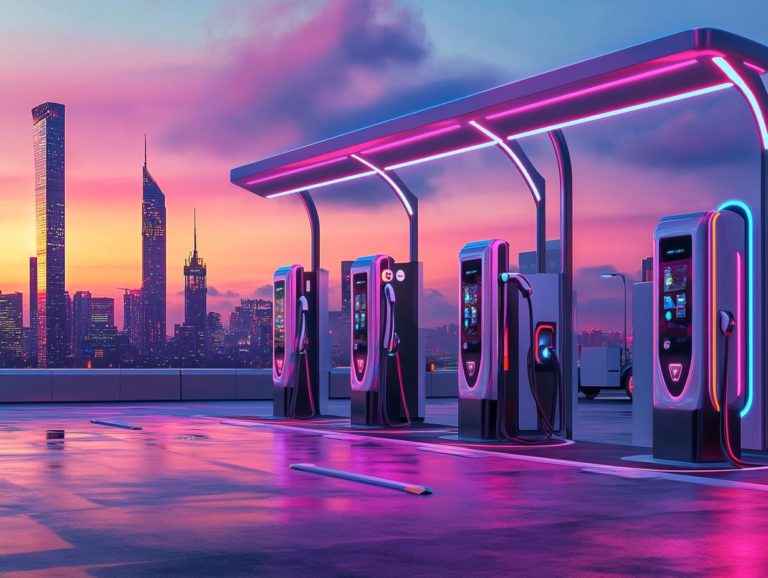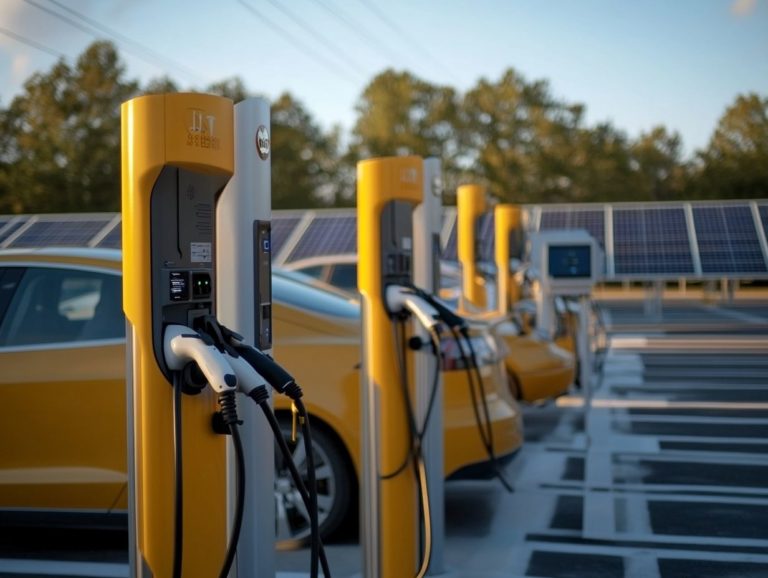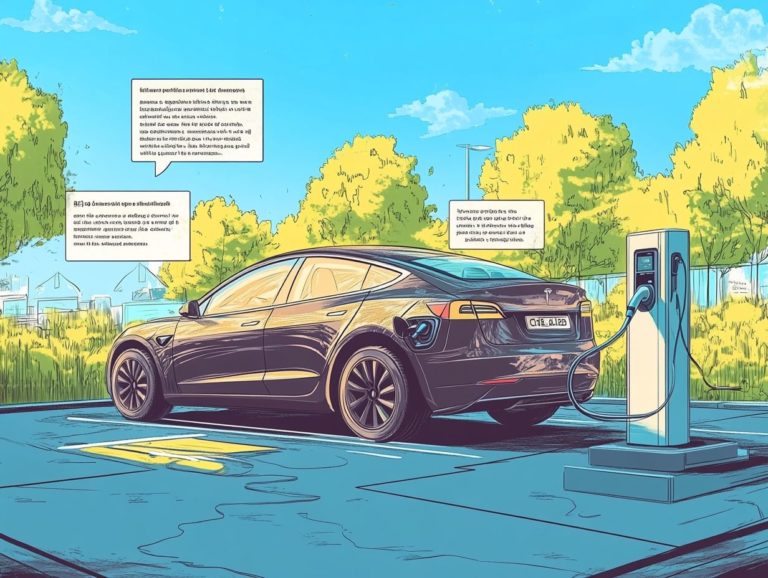how to troubleshoot common ev charging issues
Electric vehicle (EV) owners frequently face charging challenges that can be both frustrating and inconvenient.
Whether you re charging at home or relying on public stations, understanding common issues and their solutions is essential for a smooth EV experience.
This guide will help you diagnose charging problems, compare the challenges of home versus public charging, and tackle slow and fast charging dilemmas. You ll also find practical tips to help you prevent future issues.
Let s dive into these essential tips for a smoother EV charging experience!
Contents
- Key Takeaways:
- Troubleshooting Charging Equipment
- Charging at Home vs. Public Charging
- Dealing with Slow Charging
- Dealing with Fast Charging
- Tips for Preventing Charging Issues
- Frequently Asked Questions
- 1. How can I troubleshoot a charging issue with my EV?
- 2. What should I do if my EV charging station is not providing power?
- 3. Why is my EV charging slowly or not at all?
- 4. How do I troubleshoot a problem with my EV’s battery?
- 5. What can I do if my EV is not connecting to the charging station?
- 6. What should I do if my EV charging station is tripping the circuit breaker?
Key Takeaways:
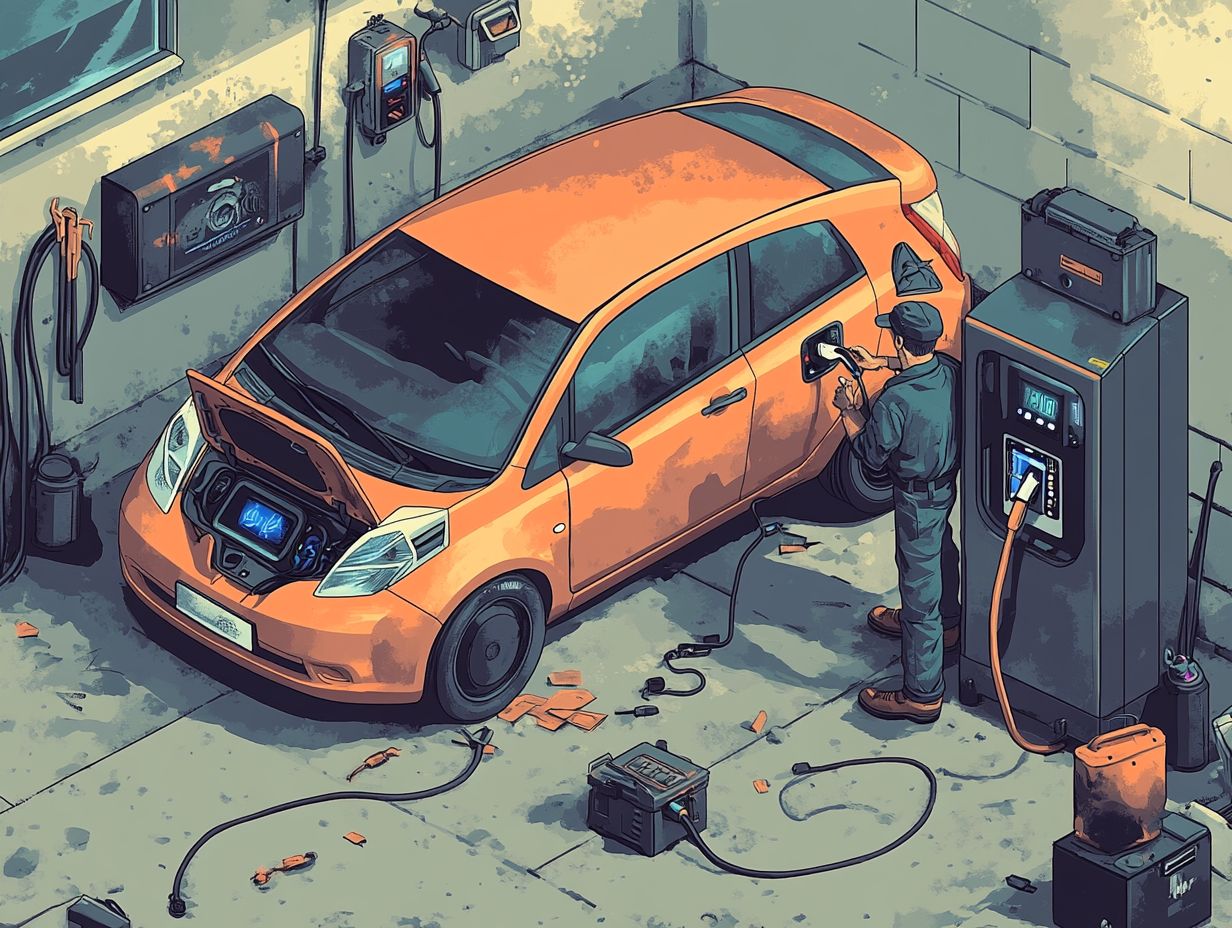
- Regular maintenance and following best practices can help prevent common EV charging issues.
- When troubleshooting, start by diagnosing and fixing issues with the charging equipment itself.
- Charging at home may have fewer potential problems compared to public charging, but both can experience issues.
Overview of Common Problems
When it comes to electric vehicle (EV) charging, you may encounter a range of common problems that can disrupt your overall experience. These issues can include hardware malfunctions, software glitches, or connectivity issues with the charging network. Knowing how to use a public EV charging station can help mitigate some of these challenges.
For example, charging cables can wear down over time with frequent use. This can lead to inconsistent power delivery or even safety risks. Software issues like outdated software that helps the charging station work properly or misconfigured settings can prevent proper communication between your vehicle and the charger. Also, a weak internet connection can complicate matters for network-dependent charging stations.
Regular maintenance checks are important. Here are some helpful actions to consider:
- Inspect charging equipment for wear and tear.
- Update software as needed.
- Ensure a stable internet connection.
By taking these actions, you can significantly enhance your charging experience and prolong the lifespan of your equipment.
Troubleshooting Charging Equipment
Troubleshooting charging equipment for electric vehicles is crucial for ensuring top performance and reliability. This often involves a step-by-step process to diagnose and repair issues.
You may encounter challenges, from malfunctioning charging stations to software problems or compatibility concerns across different manufacturers.
By following a structured troubleshooting strategy and consulting manufacturer guidelines, you can effectively resolve these problems. For more detailed assistance, check out resources on troubleshooting common EV problems, ensuring that your EV charging solutions work seamlessly.
Steps to Diagnose and Fix Issues
To effectively diagnose and resolve issues with EV charging points, follow these systematic steps:
Start by inspecting the charging cable for any signs of damage. Then, check the power source and ensure all connections are secure. Don t hesitate to utilize any smart charging apps you have for diagnostics.
Examine the charging port on your vehicle for any debris or corrosion that might hinder connectivity. You should also test the circuit breaker linked to your charging point to ensure it hasn t tripped, interrupting power flow.
Since smart technology plays a key role in modern solutions, using the monitoring features of smart charging systems can provide valuable insights and alerts regarding performance and potential malfunctions.
With careful inspection and the use of technology, you can resolve current issues and enhance the longevity and reliability of your charging stations.
Start troubleshooting today and enjoy a hassle-free charging experience!
Charging at Home vs. Public Charging
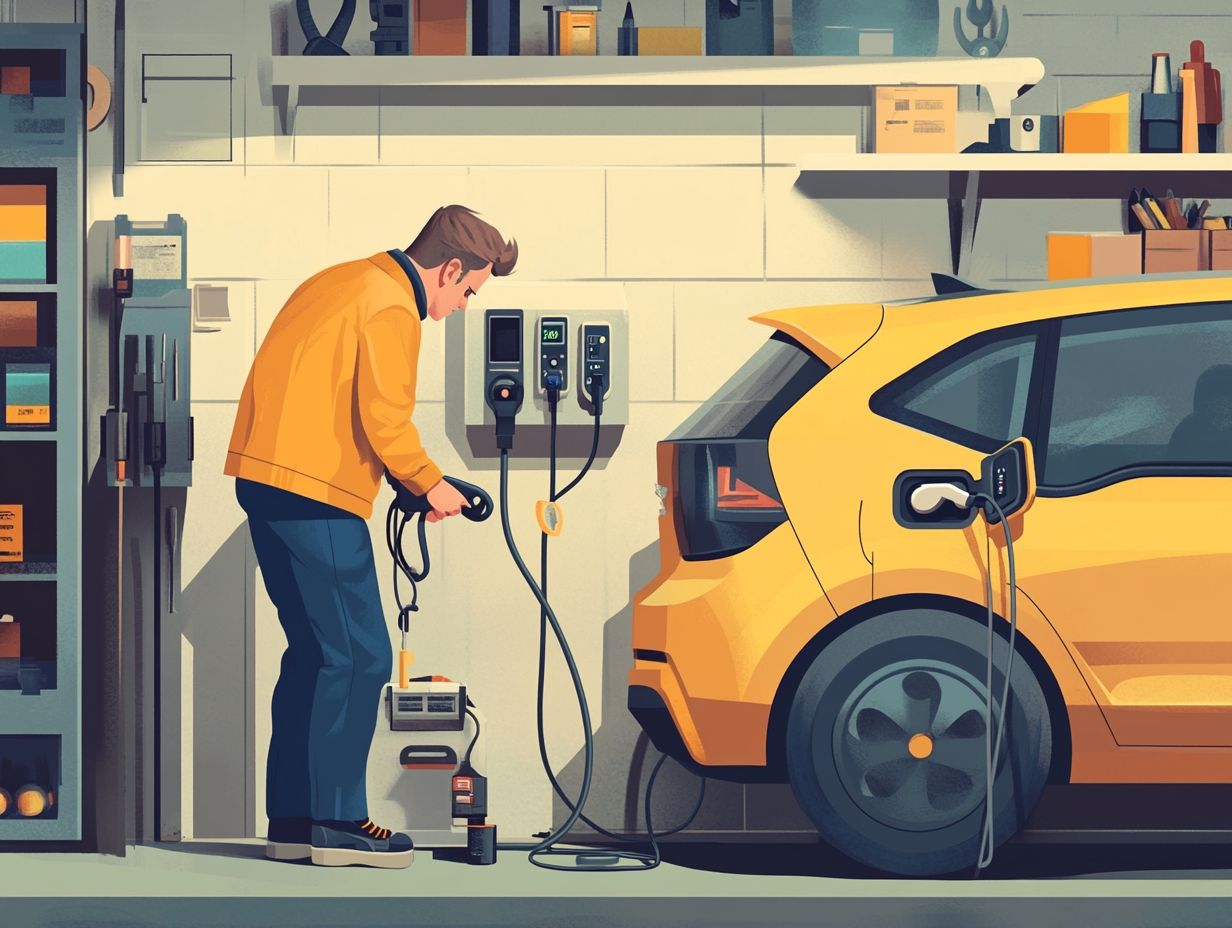
Deciding whether to charge your electric vehicle (EV) at home or at public stations involves weighing benefits and drawbacks. Consider both options carefully.
Home charging offers unmatched convenience and control over your installation and energy rates. Public charging, however, can present challenges like availability, connectivity issues, and varying performance at charging stations.
By understanding the differences between these two options, you can make informed choices that enhance your overall charging experience.
Comparison of Potential Problems
When weighing the challenges of home charging against public charging, several factors influence your EV charging experience. Charging speed, connectivity issues, and equipment reliability can vary significantly between these two settings.
By understanding these factors, you can navigate your charging preferences and minimize frustrations. For example, home charging allows you to plug in overnight and imagine waking up every day to a fully charged battery!
However, slower charging speeds may be a concern, especially if you rely on standard outlets and have a high daily mileage. Public charging stations often provide faster options, but they come with their own challenges, such as availability issues and connectivity hiccups.
You might have to navigate crowded facilities or deal with malfunctioning equipment, which can disrupt your plans. Understanding these variables helps you make informed decisions about where and how to charge your EV effectively.
Dealing with Slow Charging
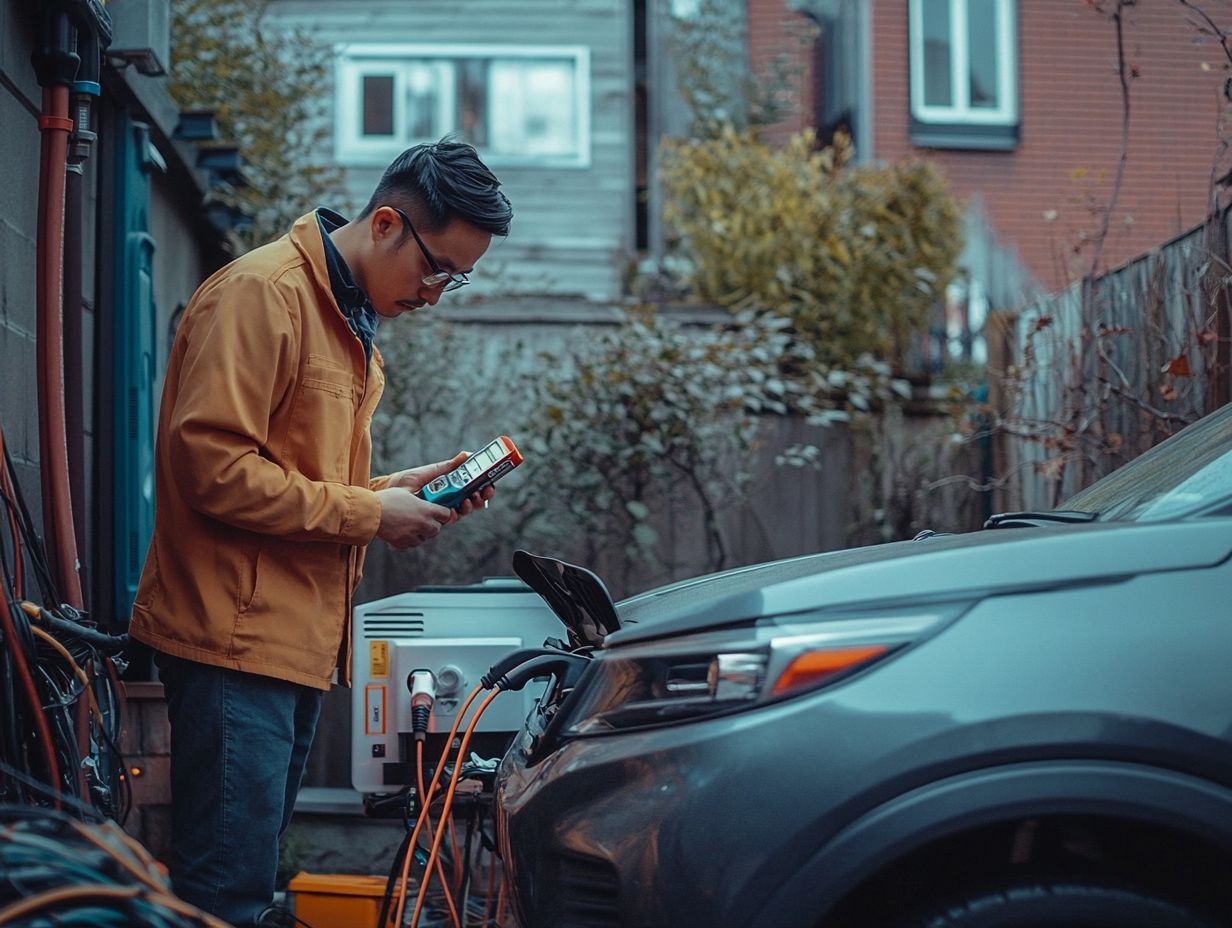
Dealing with slow charging can be a headache for EV owners, as it impacts charging efficiency and overall performance.
Several culprits can cause slow charging from inadequate power sources and faulty cables to software limitations within the charging station itself. Identify these issues and fix them to charge on time.
Possible Causes and Solutions
Understanding the potential causes of slow charging is crucial for enhancing your EV charging experience. Common issues include an inadequate power supply, connectivity problems, and even hardware or firmware issues, which is the software inside your charging station that may need updates.
An insufficient power supply at the charging station can significantly slow down the process. If the station isn t delivering enough wattage, your charging times will stretch longer than you’d like.
Loose cords or dirty connectors can also hinder power transfer and cause delays. To tackle these challenges, regularly inspect your charging equipment, ensuring everything is clean and securely connected.
Upgrading to a higher-capacity charging station or verifying the power supply s output can noticeably improve charging efficiency. Implementing these practical fixes can transform your overall electric vehicle experience.
Dealing with Fast Charging
Navigating the world of fast charging brings unique challenges for EV users, particularly regarding efficiency and performance at charging stations. While fast charging can dramatically reduce downtime, you may face potential issues such as overheating or voltage fluctuations.
This highlights the importance of being proactive about troubleshooting and mitigating risks associated with rapid energy transfer. Grasping these challenges is essential for fully leveraging the benefits of fast charging.
Possible Causes and Solutions
Fast charging issues can frustrate electric vehicle (EV) users. Common culprits include inadequate energy supply, improper connections, and overheating from rapid charging.
By addressing these problems, you can enjoy a safer and more efficient charging experience.
Selecting the right charging station is key. Choose one that s compatible with your EV model and has advanced technology to ensure optimal speeds while protecting your battery.
Regularly check your charging cable and connector to prevent wear and tear. Avoiding fast charging in extreme temperatures can help protect your battery and extend its lifespan.
Tips for Preventing Charging Issues
Preventing charging issues for electric vehicles (EVs) is vital for creating a seamless user experience and maximizing the performance of charging stations. By prioritizing regular maintenance and following best practices, you can sidestep common pitfalls associated with hardware, software, and overall charging efficiency.
Key actions to consider include:
- Conducting routine inspections of charging cables.
- Performing software updates for your charging station.
- Actively monitoring the charging environment to tackle potential problems proactively.
Regular Maintenance and Best Practices
Engaging in regular maintenance and adhering to best practices is essential for you as an electric vehicle (EV) owner to ensure that your charging stations operate at peak performance and efficiency. This involves conducting routine checks on your equipment, keeping an eye on software updates, and addressing any physical damage to cables or connectors promptly.
Monitoring battery health and ensuring that your connections are secure can help you avoid unexpected interruptions. Consider scheduling annual professional inspections; they can uncover hidden issues early, potentially saving you costs down the line.
By proactively watching for wear and tear, you can tackle problems before they escalate, ensuring that your charging facilities remain reliable and effective. These consistent efforts contribute to optimal performance, giving you peace of mind as you navigate your daily commutes and long journeys alike.
Frequently Asked Questions
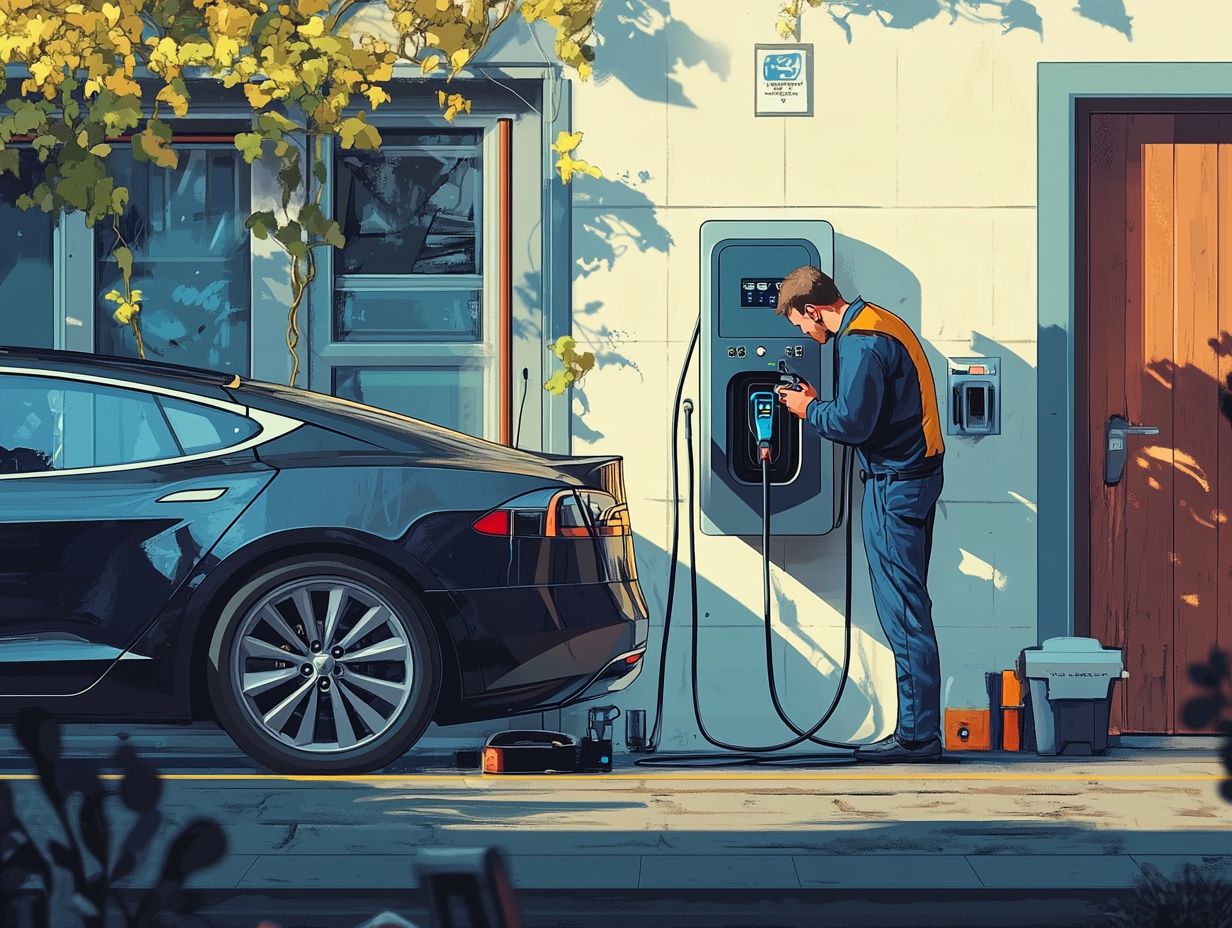
1. How can I troubleshoot a charging issue with my EV?
If you’re experiencing problems with your EV charging, the first step is to check the charging cable and make sure it is properly connected to both the vehicle and the charging station. You should also check the outlet or charging station to ensure it is providing power. If these steps do not resolve the issue, refer to this guide on how to troubleshoot EV charging problems or consult a professional.
2. What should I do if my EV charging station is not providing power?
If your EV charging station is not providing power, the first thing to check is the circuit breaker. Make sure it is not tripped or turned off. If the circuit breaker is functioning properly, the issue may be with the station itself. In this case, you may need to contact the manufacturer for troubleshooting assistance or consult a professional.
3. Why is my EV charging slowly or not at all?
There are a few potential causes for slow or no charging. First, check the power source to ensure it is providing the necessary voltage and amperage for your EV. Next, make sure the charging cable is in good condition and properly connected. If these factors are not the issue, it’s possible that your EV’s battery may need to be replaced or serviced.
4. How do I troubleshoot a problem with my EV’s battery?
If you suspect there may be an issue with your EV’s battery, the first step is to check the battery’s state of charge. If it is low, try charging it with a different outlet or charging station. If the battery still does not charge, you may need to have it serviced or replaced by a professional.
For any further assistance or to learn more about maintaining your EV s charging system, feel free to reach out for help!
5. What can I do if my EV is not connecting to the charging station?
If your EV won’t connect, first check the charging cable. Ensure it’s in good condition and securely plugged in.
If the cable seems fine, the issue might be with the charging port on your EV. You may need a professional to inspect and repair it.
6. What should I do if my EV charging station is tripping the circuit breaker?
If your charging station keeps tripping the circuit breaker, it could indicate a problem with the station. Check the manufacturer’s instructions for troubleshooting tips.
If that doesn t help, contact them for support. It’s also smart to consult an electrician to confirm your home s electrical system can handle the charging station s demands.

